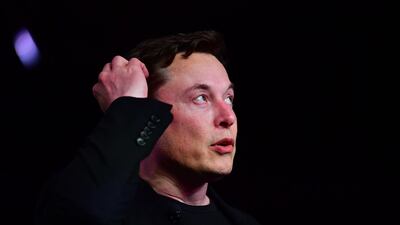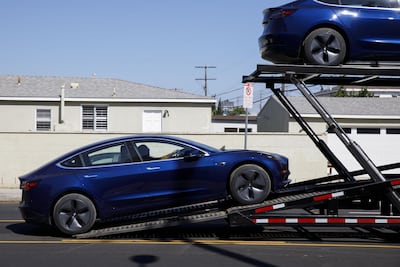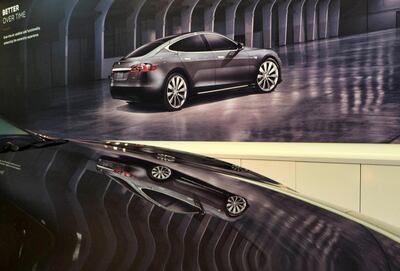Tesla shares sank as much as 11 per cent to $260.10 before the start of regular trading in New York on Thursday after a record decline in deliveries during the first quarter.
The firm's $1.8 billion junk bond price fell by the most in seven months and the cost to insure its debt against default surged. Its 5.3 per cent senior unsecured note due in August 2025 fell 2.17 cents to a bid price of 85.2 cents on the dollar, with its yield rising nearly half a percentage point to 8.34 per cent in active European trading. It was the largest price drop since September, Reuters said.
The bond's yield spread, the measure of additional compensation demanded by investors to own the security rather than safe-haven US Treasuries, widened by 50 basis points. The cost for a five-year credit default swap, a form of insurance against default, rose by the most in a day since October.
The electric car maker's drop in deliveries is stoking concern demand is slackening for the cheaper Model 3 it introduced less than two years ago.
The company delivered 63,000 vehicles in the three months that ended in March, down from 90,966 in the fourth quarter, Bloomberg reported.
In the US, where Tesla introduced the Model 3 saloon in 2017, tax incentives for its vehicles shrank. In Europe and China, the company struggled to quickly get the cars to consumers. The 50,900 Model 3 Tesla delivered in the first quarter missed analysts’ average estimate for 51,750 and and was fewer than in the two previous quarters. The shortfall is a setback for chief executive Elon Musk’s plan to accelerate sales with lower prices and targeting more markets worldwide.
“It’s a disappointment. There’s no way around that,” said Gene Munster, a managing partner of venture capital firm Loup Ventures. “The big question is, what is demand?”
Tesla reiterated its forecast of 360,000 to 400,000 vehicle deliveries in 2019, which Mr Munster called a “silver lining” that may show buyers are still clamouring for the cars. But Tesla’s history of missing Mr Musk’s ambitious projections may make it difficult to have confidence in the outlook, he said.
Tesla released the figures after the late trading session Wednesday in New York. The shares have slumped 12 per cent this year amid demand concerns, multiple price cuts, job reductions and a continued exodus of senior executives.
Mr Musk capped the quarter with a tweet referring to the work his delivery teams had done as the “most insane logistics challenge” he’d ever seen.
Tesla had a total of 10,600 vehicles in transit at the end of last month as the company started sales of the Model 3 in China and Europe. That’s more than triple the number that were still making their way to customers at the end of 2018, although it’s not unprecedented - more Tesla vehicles were in transit at September’s close.
While Model 3 deliveries were underwhelming, investors may give Tesla the benefit of the doubt because it was shipping so many cars to new markets for the first time, said Dan Ives, an analyst at Wedbush Securities. “The Street was expecting an apocalyptic quarter and Model 3 deliveries were better than feared by many,” he said.
Shipping cars to customers outside the US was critical toward helping make up slack in demand after the federal tax credit Tesla customers were eligible for was cut in half as of January 1. While this pulled some demand forward into the fourth quarter, the company said orders still outpaced the number of vehicles it was able to deliver in the first three months of this year.
The company had warned shareholders that first-quarter deliveries of the pricier Model S saloon and Model X 4x4 probably would be lower than a year ago because customers rushed to buy in time for the full $7,500 incentive.
Analyst Joseph Spak of RBC Capital Markets noted that Model S and X deliveries, which totalled 12,100, were the lowest since the third quarter of 2015. “To us, this signals that the tax subsidy cut in the US was a significant hit to these premium vehicles and/or Model 3 is having a bigger cannibalisation impact,” he said in a note.
Several Wall Street analysts cut their delivery estimates as the quarter came to an end, citing the tax credit and delays in overseas shipments. Mr Musk also cautioned on Tesla’s January 30 earnings call that seasonality would come into play in the first quarter, with auto sales tending to be lowest in January and February and picking up in March.
“We’re past peak Tesla,” said David Kudla, CEO of Mainstay Capital Management, which bets against Tesla by shorting the stock. “There’s slowing demand for the Model 3 and there’s nothing else immediately in the pipeline.”
Tesla’s debut of a long-promised $35,000 version of the Model 3 during the quarter was overshadowed by announcements of significant cost cuts Musk said were necessary for the company to be able to offer the car at that price point.
First, the CEO said in January the company would cut about 7 per cent of headcount - more than 3,000 jobs. At the end of February, Tesla paired its February 28 announcement of the base Model 3 and price cuts across its line-up with a plan to close all but a small number of stores, shift all ordering online and dismiss an untold number of sales and marketing personnel. The moves blindsided some staff, and the company backtracked just 10 days later.
Tesla ended last year with about $3.7 billion of cash and equivalents, but had to pay off a $920 million convertible bond in February. While Mr Musk warned the company probably would lose money last quarter, and the car maker has a $566m note coming due in November, Tesla has said it has enough money to pay off debt obligations with cash flow.
“Because of the lower than expected delivery volumes and several pricing adjustments, we expect Q1 net income to be negatively impacted,” Tesla said in its deliveries statement. “Even so, we ended the quarter with sufficient cash on hand.”
Separately, Tesla announced on Wednesday that it will give investors an up-close look at its self-driving car in a bid to bolster confidence in the progress of the nascent technology.
Mr Musk and other executives will take part in presentations to investors at the company's Silicon Valley headquarters on April 19, AFP reported.
"Tesla is making significant progress in the development of its autonomous driving software and hardware, including our FSD computer, which is currently in production and which will enable full-self driving via future over-the-air software updates," the electric car maker said.
The event will include test drives and is intended to provide an in-depth look at Tesla's self-driving vehicle progress, according to the company, which declined to comment further.




